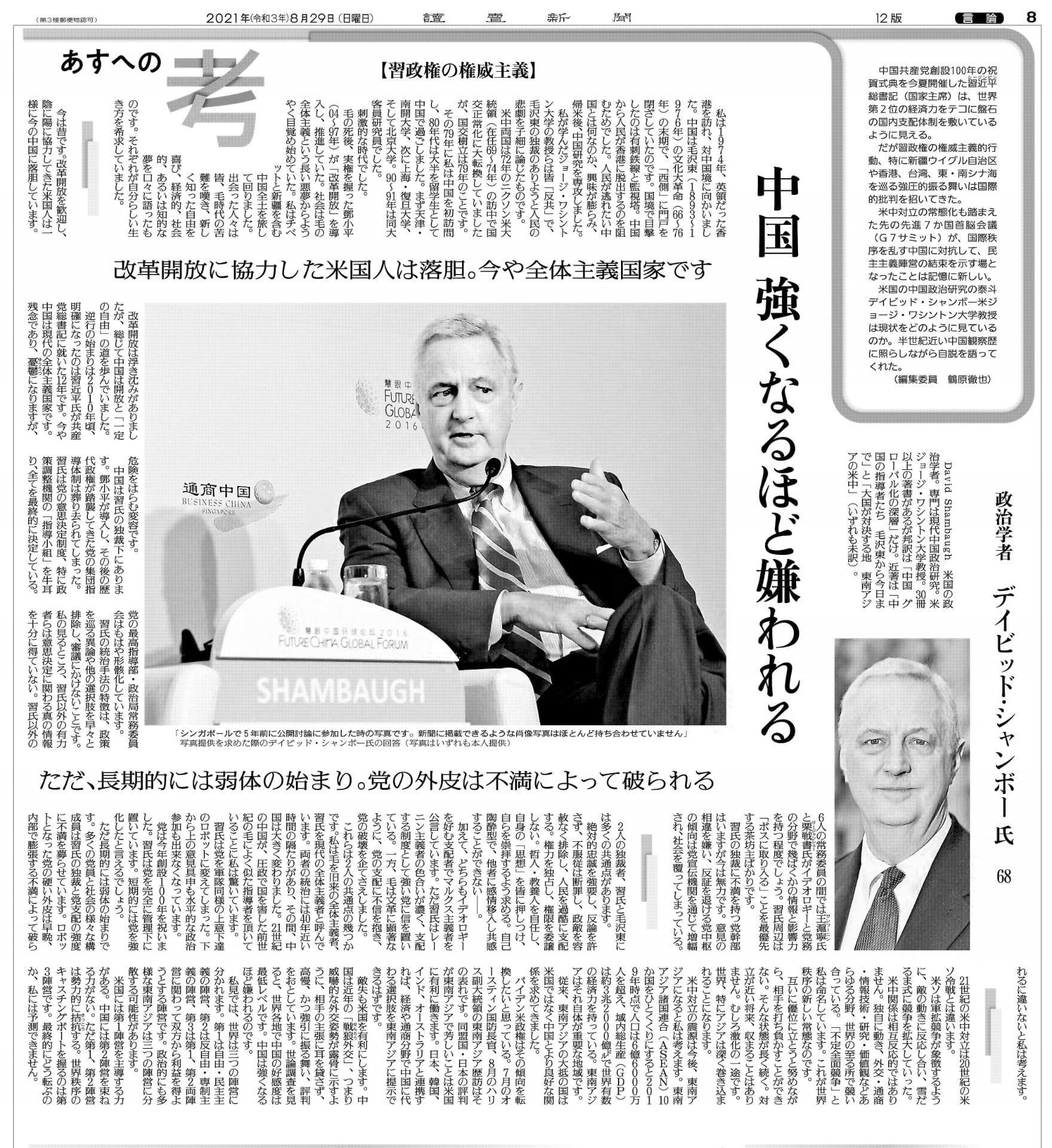Yomiuri Shimbun on August 29, 2021:

Nikkei Asia on August 29, 2021:
Understanding China’s conflicted nationalism:
Beijing’s aggressive behavior undermines its soft power ambitions
Original article published on Nikkei Asia
Why is it that every time the world thinks China is becoming a constructive and cooperative international partner, Beijing lashes out and undermines its own global reputation?
Just when it seems that China is becoming a comfortable status quo power exhibiting “confident nationalism,” as the late Sinologist Michel Oksenberg once described it, its government reverts to more assertive, acerbic, defensive, and revanchist forms of public diplomacy.
Despite China’s long-standing propaganda protestations that it is a well-meaning benign country, a good neighbor, that it will “never seek hegemony,” and that it works with others for “win-win solutions” to global problems, it frequently undermines these messages with contradictory rhetoric and behavior.
The Chinese government is often accused of ignoring public diplomacy to the extent that it weakens its soft power. In fact, Beijing has long paid attention to public diplomacy and efforts to project a positive image to the outside world — beginning with Mao’s interviews with Edgar Snow in Yanan in 1939, the friendship diplomacy of the 1950s, the revolutionary diplomacy of the 1960s, the ping-pong diplomacy of the 1970s, the reform and opening diplomacy of the 1980s, and then-President Hu Jintao’s admonition to build soft power in 2007.
More recently. President Xi Jinping instructed in his June 2 Politburo directive to display a “more credible, lovable, and respectable China,” “tell China’s story well,” and become a “public communications power.”
In the early 2000s, a separate Central Committee department of external propaganda was created to spearhead a multifaceted campaign to promote China abroad, which has since been reabsorbed within the Chinese Communist Party’s propaganda department. In 2009, China’s Ministry of Foreign Affairs inaugurated its own public diplomacy department, and a system of ministerial spokespersons was created to interface with foreign media. China’s embassies abroad similarly designated spokespersons.
Notwithstanding these efforts to project a positive image, Beijing has punctuated them with periodic angry outbursts, accusatory rhetoric, and an aggrieved national persona-now commonly described as “wolf warrior diplomacy” led by Foreign Ministry spokespersons Hua Chunying and Zhao Lijian.
Chinese ambassadors abroad are also increasingly outspoken. Ambassador to France Lu Shaye and ambassador to Sweden Gui Congyou have been particularly caustic in their public remarks. Following criticisms of China in the communiques from the Group of Seven, U.S.-EU, and NATO summits in June 2021, the London and Brussels embassies sprang into action with sharp critiques.
Xi’s June 2 speech seemed to evince awareness of this when he also said that China should be “open and confident, but also modest and humble.” Xi’s convening of the special Politburo study session on public diplomacy is thought to have been a response to the wolf warrior critiques as well as global public opinion polls that show China’s global favorability ratings at all-time lows. In mid-August, the Pew Research Center issued new data showing a continued sharp deterioration dating back to 2018.
This acerbic nationalist posture is likely to become a continual feature of China’s diplomacy. There are three principal causes for it.
First, it is hardwired into the CCP’s institutional identity and its claim to ruling legitimacy. This is because the entire narrative the party has spun since its founding in 1921 has focused on its efforts to overcome China’s “century of shame and humiliation” that began in the 19th century. This translates into zero tolerance for disrespect from other — notably Western — countries.
Second, the regime under Xi today believes that China is no longer a second-rate power, that the tide of history has turned, and that China is becoming the world’s dominant power.
Third, Chinese citizens are deeply infused with uber-nationalism and a sense of national accomplishment — they take great pride in their government officials pushing back against perceived discrimination.
What is odd — and conflicted — about China’s nationalism today is that it reflects both security and insecurity. On the one hand, China takes great pride in its accomplishments, its history, and sense of global importance. On the other hand, there remains a strong residual streak of aggrievement, and revanchism — which produces a sense of brittleness that is quick to react to any perceived slight and hit back against perceived “foreign hostile forces.”
The CCP itself still lives in the shadow of the Soviet collapse and the East European “color revolutions,” and the palpable paranoia is apparent in the CCP’s wide-ranging domestic repression. Foreign nongovernmental organizations working in China have come under particular pressure — forcing the majority to abandon operations there.
China’s pushback is also coupled with a sense of payback — as Chinese nationalists are increasingly demanding punitive actions against those who have previously infringed on China’s sovereignty and sense of dignity. The U.S., Europe, Australia and Japan head the list.
This is playing out in the form of Beijing banning a variety of individuals and institutions from visiting or conducting business with China, punitive economic statecraft — sanctions, investment bans, high taxes, tariffs and non-tariff barriers on trade and doing business in China, blocking normal academic and cultural exchanges, and threatening military moves against neighbors.
These types of punitive measures can be expected to proceed alongside the increasingly acerbic rhetoric emanating from Beijing. With this new aggressive national persona on display, it will only alienate other countries, undercut Beijing’s official protestations of cooperation and peaceful intent, and contribute to the growing global image of China as a threat.

